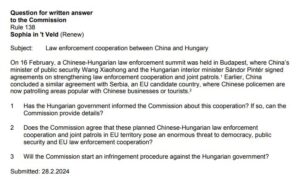At a time when Budapest’s relationship with its EU and Nato allies is at a low point, Xi’s regime offered to deepen security cooperation with Hungary, deepening Budapest’s ties with Beijing. Does the European Commission know about it? Sophie in ‘t Veld, MEP of the Reniew Group, formally asked the Commission if the EU institutions reacted to Hungary’s choice.
A China-Hungary law enforcement summit was held in Budapest on Friday, 16 February, with Sándor Pintér, the interior minister, holding talks with Wang Xiaohong. The two sides signed agreements enabling Chinese police officials to patrol on Hungarian soil. On 19 February, Hungary’s prime minister, Viktor Orbán, met China’s minister.
China’s official news agency, Xinhua, has published comments from the Chinese Minister of Public Security saying that he hopes to strengthen cooperation with Hungary in areas such as counter-terrorism, combating transnational crimes, security, and law enforcement capacity building under the Belt and Road initiative. Hungarian prime minister praised the strong ties between Hungary and China, which he said are based on respect – “an otherwise dwindling commodity in international diplomacy”.
Orbán made his country a pariah within Europe.
Hungary navigates in murky waters. It is a member of the EU and NATO. Thus, China’s offer is highly unusual.
Budapest has close ties with both Moscow and Beijing and is known to support Putin’s regime. Last year, Hungary’s prime minister was the only EU leader to attend the Beijing Belt and Road Initiative forum, indicating the country’s strong relationship with China. China’s electric vehicle manufacturer BYD has also announced plans to open its first European production factory in Hungary. However, Hungary’s delay in ratifying Sweden’s NATO application has led to losing trust in the country.
Senior Hungarian officials were absent at the Munich Security Conference, further demonstrating Budapest’s isolation.
In mid-February, Hungarian officials refused to meet with visitors from Washington.
“Allies have been awaiting Hungary’s action on Sweden’s accession to NATO for 21 months. Valuable discussion between members of various political parties in Parliament and a distinguished bipartisan delegation from the United States Senate,” the US ambassador in Budapest, David Pressman, wrote on X.
“Regrettably, a range of senior Hungarian government officials and Fidesz parliamentary representatives declined to meet with the most senior US bipartisan congressional delegation to visit Hungary in years,” he added.
Nevertheless, in a recent speech, Orbán declared he wished for a Trump return.
“We cannot interfere in other countries’ elections, but we would very much like to see President Donald Trump return to the White House and make peace here in the eastern half of Europe.”
No doubt! Hungary under Orbán’s regime became a real burden for the EU and its defence.
Sophie in ‘t Veld’s questions
In an official “Question for written answer to the Commission”, Sophie in ‘t Veld posed three crucial questions.
“First: has the Hungarian government informed the Commission about this cooperation? If so, can the Commission provide details?”
“Second: does the Commission agree that these planned China-Hungary law enforcement cooperation and joint patrols in EU territory pose an enormous threat to democracy, public security and EU law enforcement cooperation?”
And “third: Will the Commission start an infringement procedure against the Hungary government?”
The answer and the subsequent movements of the Commission will be critical.

In June 2024, Hungary will have the next EU Presidency (July–December 2024). Several political forces raise doubts about the ability of the Hungarian government to perform such a delicate task. Many seek ways to prevent a traumatic experience for the EU that a Hungarian Presidency will represent.
After the agreements between the Hungarian and Chinese governments, Budapest made clear who it wanted as allies.
China’s efforts to extend its long arm on the EU’s law enforcement
However, this is not the first time Chinese police officers will patrol the EU territory. For years, Beijing promoted, alongside the Belt and Road Initiative, “extradition treaties” with some EU member states. Several EU countries, including Spain, France, and Italy, signed such agreements with China in the previous decade.
The interest of the Chinese side targeted dissidents, democracy and national activists, Uyghurs and Tibetans, and human rights defenders from mainland China and Hong Kong and Taiwanese citizens. With such extradition treaties, Beijing sent hundreds of red notices to Interpol. All these, without counting the several kidnappings committed by the Chinese secret services in many EU members.
Some EU countries that signed agreements with Beijing proved spectacularly helpful to China’s interests.
For example, the Spanish government, as of July 2019, deported to China 218 Taiwanese citizens.
Italy signed a police cooperation agreement in 2016. Consequently, Chinese police agents patrolled several tourist places – such as Rome or Florence – and areas with considerable Chinese populations – as it is Prato’s industrial city.
Fortunately, Italy avoided the tight grip of China by abandoning the BRI in Autumn 2023.
Several EU member states now understand how dangerous China is for their freedom and react accordingly. Hungary does the opposite.

